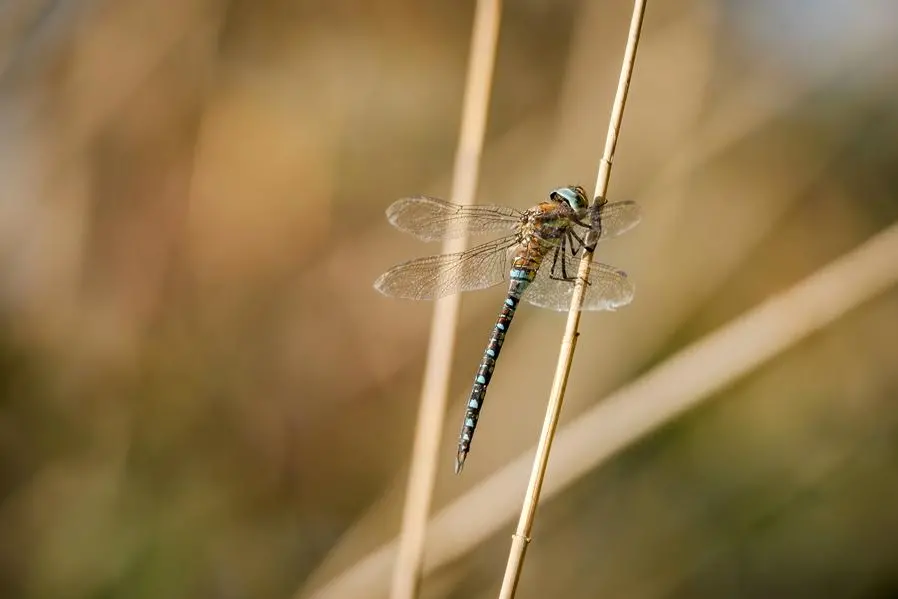PHOTO
UAE residents witnessed a sudden surge in dragonflies all around the country, taking over parks and backyards. "All of a sudden, the mayflies hovering around my entrances are gone, and hundreds of dragonflies have taken over the community. I hope it's a good sign," said Safora Jalali, a long-time UAE resident.
Abu Dhabi resident Sean de la Harpe-Parker wrote on his community page, "Nature will always find balance; hopefully, we can learn not to interfere," sharing a video of dragonflies. The South African's post followed a few others from community members asking if the emergence of so many dragonflies was "normal".
"There is no reason for concern. Dragonflies are in no way harmful to humans," Gary Feulner, Chairman of Dubai Natural History Group (DNHG) told Khaleej Times. "On the contrary, because dragonflies are predators on smaller flying insects, we should probably be very happy to see them."
Gary, who is the lead author of the latest comprehensive account of UAE dragonflies, said, "They will help guard against the potential for pest insects and possible disease carriers to breed in the post-flood landscape of pools and puddles. Unfortunately, pesticide use is likely to eliminate the dragonfly predators as well as their prey."
The UAE recently experienced increased rainfall combined with hotter and prolonged summers. In less than 24 hours on April 16, the country recorded its highest-ever rainfall. This transformed the UAE's landscapes into lush green areas and led to significant water accumulation, a breeding ground for mosquitoes.
Speaking to Khaleej Times, conservationist Sean said, "Dragonflies are predatory and feed on other insects, including mosquitoes. The ponds and pans created by the recent rains have allowed mosquitoes to breed until the arrival of dragonflies. They are now effectively controlling that in an environmentally friendly way without the need for pesticides."
Pranjal Kulkarni, who has lived in the UAE for 22 years, said, "We've been seeing an unprecedented number of mosquitoes. I wondered if the dragonflies would come - and they have! Amazing hunters - they fly at 40kmph or even more! They eat mosquitoes; their young eat mosquito larvae. They are harmless to humans, so we don't need incessant fogging with chemicals to try and eradicate the mosquitoes."
Wandering Glider
Explaining the phenomenon, Gary said, "The dragonfly that makes up the bulk of the UAE swarms is the Wandering Glider (Pantala flavescens). It is the world's most widespread dragonfly and is found in open areas in the tropics and subtropics worldwide.
"Wandering Gliders can be found both near water and far from it. They are also capable of long mass migrations using weather fronts to assist them, and they might have done that during the mid-April rains. Those weather fronts normally bring rain, which allows the arriving dragonflies to prosper by breeding in the freshwater bodies that are created, filled or refreshed by the rain.
"Dragonfly eggs and their bug-like larvae (nymphs) develop entirely in freshwater. One attribute that contributes to the success of the Wandering Glider is its ability to breed and grow very quickly in temporary pools.
"From all photos that I have seen of Wandering Gliders perched on Dubai balconies (up to the 30th floor!) were taken in mid-May and showed immature or sub-adult male; the yellow-gold colours of the juveniles had not yet fully changed to the red of adult males. This suggests to me that the dragonflies seen in mid-May were born in the immediate aftermath of the mid-April flood, having hatched from an egg and completed the nymphal stage in the intervening 30 days, assisted by the higher-than-normal temperatures experienced during that period."
Are they permanent residents?
The parents of the current swarms of dragonflies came to the UAE to take advantage of the flood conditions, and their numbers will gradually diminish as conditions return to normal. The Wandering Glider has always been present in the UAE in moderate numbers, although it is generally uncommon in urban and desert areas.
Gary, who also co-authored Butterflies of the UAE with Binish Roobas, said, "If changing weather patterns bring more rain to the UAE and more often, then we can expect the Wandering Glider and other dragonflies to return and/or expand their numbers, taking advantage of what (for them) are more favourable conditions."
Pranjal, a Master in Zoology, said, "I love letting beneficial critters flourish and leaving a corner of the garden wild so that ladybird beetles, carpenter bees, spiders, wasps, honeybees, etc. find a haven to complete their life cycles. Ladybird beetles are a natural pest control for aphids, bees, and wasps of all kinds, and they are pollinators. Birds are attracted to this food source as their young need protein to grow quickly to fledge and fly off to start their own families."
The Indian expat added, "I hope people understand that we don’t have to eradicate every little critter we see. Because it’s all in the little things."
Copyright © 2022 Khaleej Times. All Rights Reserved. Provided by SyndiGate Media Inc. (Syndigate.info).





















